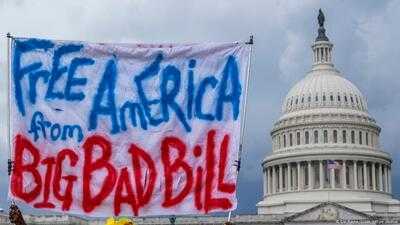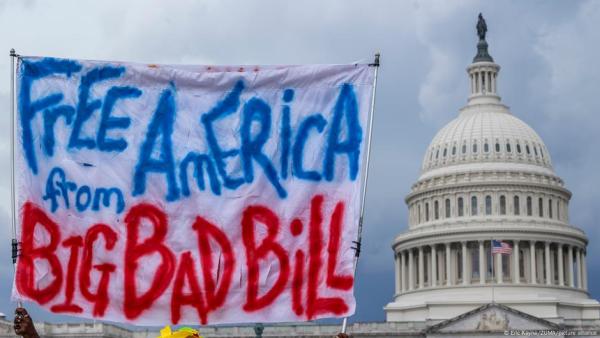

US President Donald Trump earned a significant political victory when US Congress passed his "Big Beautiful Bill." But Trump's signature tax and spending policy isn't popular, even within his own party.After pressuring fellow members of his Republican party for months, Donald Trump's "One Big Beautiful Bill Act" has passed both houses of US Congress and now only needs to be sent to his desk to be signed into law. The bill represents a critical legislative milestone and a political victory for the US president. Much of his second term has so far been marked by executive orders, which are presidential instructions with the force of laws but don't need the approval of Congress. But having this major spending and tax bill passed by Congress will finance a huge chunk of his presidential campaign promises. "I think, politically, this is a winner for Donald Trump, he can point to some sort of legislative success for his agenda," said Steven Webster, a political scientist at Indiana University in Bloomington. Trump had demanded the House pass the bill for him to sign by July 4, suggesting his desire for an Independence Day-themed victory lap. "Some people dislike the bill because of the cuts to part of the American health care and safety net system," said Peter Loge, a political analyst at George Washington University in Washington, DC. "Some people don't like the legislation because it adds a tremendous amount to the US debt. It's incredibly expensive." So what's in the 'One Big Beautiful Bill Act'? The big bill is a big attempt to check off Trump's long list of campaign promises. It includes a mix of individual and business tax cuts, massive cash injections to immigration controls, increased military spending and a ramping up of fossil fuel incentives. There are also changes to health and social program eligibility and a winding down of some of the climate transition initiatives introduced by former President Joe Biden. The winners, unsurprisingly, are policy realms that have been the foundation of Trump's "America First" mantra. A total of $178 billion (about €150 billion) in spending will go to programs intended to restrict immigration, including resuming the construction of Trump's Mexico border wall, as well as to staff and resource border police, immigration prosecutions, detention and criminal investigations. Around $153 billion will be spent on defense: shipbuilding, missile defense, nuclear weapons and supporting military assistance of the border. And after promising to "drill, baby, drill" during his campaign and in his victory speech — a call for fossil fuel extraction to be ramped up — the bill would simultaneously incentivize gas exploration and exports, while ending concessions and incentives for electric vehicles, clean energy and emissions reduction programs. There are also tax cuts of about $4.5 trillion (€3.8 trillion) for individuals and businesses, which include Trump's pledges to stop taxing tips and overtime. "Nothing in this bill should be surprising," Loge said, "It promises to spend a lot of money capturing immigration concerns in the US... it would spend a huge amount of money strengthening our immigration system and finding and deporting people who are here without proper authorization. That's by-and-large popular among many people." A big bill, but not beautiful to everyone In both houses, Republican leaders have been forced to balance the demands of holdouts — those unhappy with the measures contained within the bill. Debt is a major concern for fiscal conservatives. Nonpartisan analysts project about $3.4 trillion (€2.3 trillion) will be added to the US national debt over the next decade because of the bill. The debt limit has been raised by $5 trillion. The debt disquiet inside the Capitol has been echoed outside, most notably from one-time Trump ally Elon Musk. Prior to the Senate passing the bill, the world's richest person and the top donor to Trump's presidential campaign threatened to run candidates against Republicans who supported the measures during upcoming primary contests, and went as far to suggest he'd start his own "America Party" in opposition. "I think the party is likely to struggle to explain how adding three-and-a-half trillion dollars to the national debt is in line with their stated goal of getting the nation's fiscal house in order," said Webster. The bill is also unpopular with the public. According to a Quinnipiac University poll from late June, 55% of US voters oppose the bill and 29% support it (the rest didn't offer an opinion). About two-thirds of Republican voters are in favor. Analysts DW spoke with said that when the content of the bill tends to be explained to voters, including Republicans, support declines. Changes to health and social programs likely play a major role. New eligibility rules, particularly for the Medicaid scheme which extends health care coverage to low-income people, and the SNAP food aid program, could see millions of people lose health insurance coverage by 2034, according to the independent Congressional Budget Office. In all, more than $1 trillion have been cut from health measures. "It's about 17 million that would lose coverage," said Elisabeth Wright Burak, a senior fellow at the Georgetown University Center for Children and Families, a nonpartisan research center. "Even if there are some sort of tax or other benefits, if you're losing your health insurance coverage, or you're losing your nutrition assistance, that's a hit to your [personal] bottom line." That could also hit important parts of Trump's MAGA base, including working Americans who have flipped their support to him during the last decade. While many of the health program changes have been made because of what Trump has called large-scale "fraud and abuse" within the US public health infrastructure, many experts have argued that the claimed attempt to cut fat from health care initiatives is hacking into muscle. "There's not a lot of fat in Medicaid," said Wright Burak. "Certainly there are things that could be improved, but most of that money is already going to health care services." Edited by: Martin Kuebler This article was originally published before the vote in the House of Representatives and updated on July 4, 2025. Poll numbers from Quinnipiac University have also been corrected.